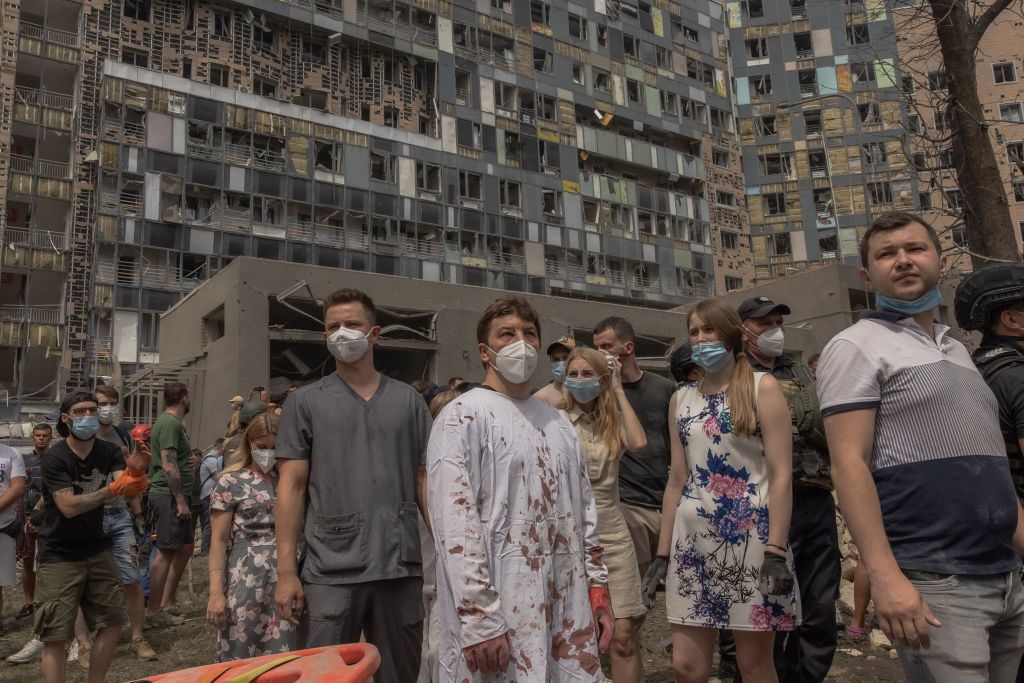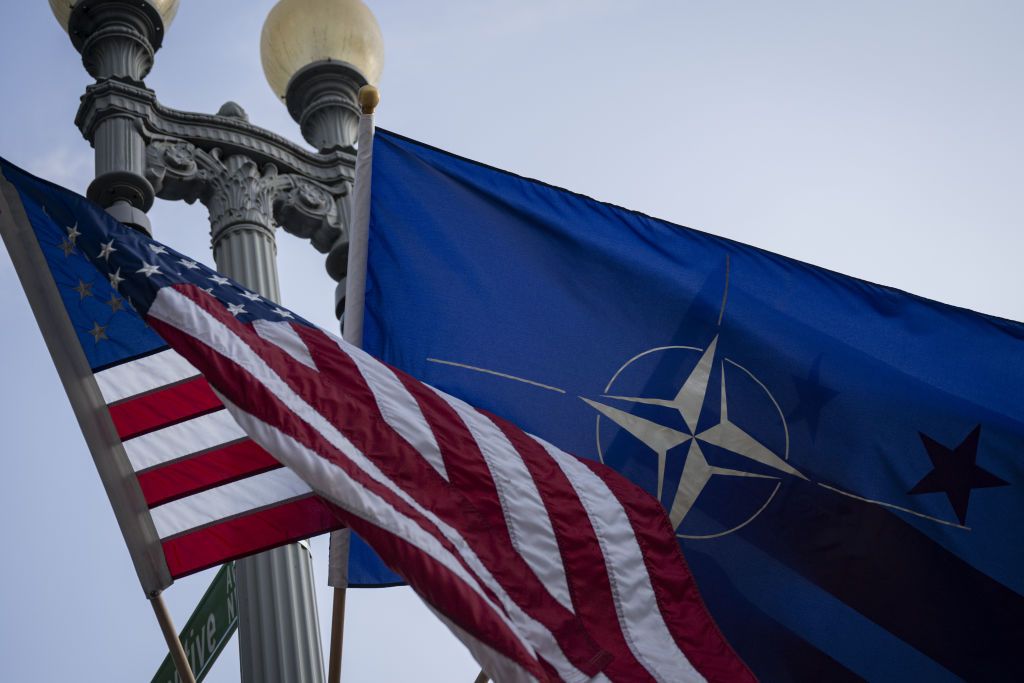Opinion: Why India’s Modi won’t play the peace negotiator
As world leaders gathered in Washington for the NATO summit, Indian Prime Minister Narendra Modi traveled to Moscow to meet Russian President Vladimir Putin.

Indian Prime Minister Narendra Modi (L) shakes hands with Russian President Vladimir Putin (R) during a meeting outside Moscow, Russia, on July 8, 2024.(Gavriil Grigorov/POOL/AFP via Getty Images)

Sushant Singh
Lecturer at Yale University
As world leaders gathered in the U.S. capital for the NATO summit, Indian Prime Minister Narendra Modi traveled to Moscow to meet Russian President Vladimir Putin. It was Modi's first visit to Russia not just since Putin ordered the full-scale invasion of Ukraine in 2022 but also since 2019. The visit follows the recent failure of Ukraine’s peace summit in Switzerland, where India’s participation was limited to an administrative level.
The peace summit came just days after Modi returned to power in India with a reduced mandate, dependent on fickle allies for a parliamentary majority. His government argued that, for any peace initiative to succeed, both Ukraine and Russia should be involved and refrained from associating with the joint communiqué issued by 80 nations at the end of the conclave.
A few days earlier, Modi had a bilateral meeting with Ukrainian President Volodymyr Zelensky on the sidelines of the G7 summit in Apulia, Italy. However, as with previous phone requests from Zelensky to Modi, the face-to-face meeting failed to change India’s stance. Since Moscow’s full-scale invasion of Ukraine, New Delhi has walked a diplomatic tightrope, often abstaining from various resolutions on the subject at multilateral bodies, including the United Nations Security Council.
India’s reluctance to criticize Russia stems from their longstanding friendly ties, dating back to the Cold War era. Moscow remains India’s largest supplier of weapons and defense equipment, including technologies and military platforms like nuclear submarines. Nearly two-thirds of India’s military equipment is of Russian origin, and this dependency will continue for at least another two decades, even if New Delhi were to stop buying weapons from Moscow now.
Before the full-scale invasion of Ukraine, Russia was a minor supplier of crude oil to India. However, after Western countries imposed stringent sanctions, India and China emerged as the biggest buyers of Russian crude, often at a significant discount. Moscow is now India’s largest supplier of crude oil, with many payments not made in U.S. dollars.
India benefits from this arrangement, which has been accepted by Western countries and Ukraine, giving Modi little incentive to disturb the status quo.
India has also faced massive trouble with China over their disputed border in the past four years, pushing relations between the two Asian neighbors down a slippery slope. Beijing has emerged as New Delhi’s main strategic challenge, and the Modi government is keen to avoid a situation where Russia is locked in on China’s side. India values its strategic sovereignty and wants to promote a multilateral global order, in which Russia is one such power and a major player in Asia.
New Delhi’s strong ties with Moscow serve India’s strategic interests and have prevented Modi from condemning Putin. However, Modi did make one feeble attempt to chastise Putin in 2022, publicly telling him that “this is not an era of war” (the phrase made it to the G20 communiqué after that year’s summit in Bali). Despite condemning the killings of civilians in Ukraine’s Bucha and calling for an independent probe, India has not joined the West in accusing Russia of the massacre. India, like China, has also expressed concerns about the rhetoric of nuclear weapon use by some Russian leaders.

Under Modi, New Delhi sees itself as an emerging great power, competing with Beijing to lead the so-called Global South and being taken seriously in most global capitals. India is regularly invited to outreach sessions of G7 summits, is a member of the Quad alongside the U.S., Japan, and Australia, is simultaneously a member of BRICS and the Shanghai Cooperation Organization (SCO) with Russia and China, and has friendly ties with both Moscow and Washington, making it better positioned than any other country to mediate Russia’s war against Ukraine.
In February, Indian Foreign Minister Subrahmanyam Jaishankar stated that India was “open (to the idea of being a mediator) when we are approached” and highlighted New Delhi’s help when Turkey negotiated the Black Sea corridor for foodgrain transport and support for inspections of the Zaporizhzhia Nuclear Power Plant by the International Atomic Energy Agency.
Despite numerous requests to mediate between Moscow and Kyiv, Modi has refused, unwilling to risk failure. He will enter the process only if success is guaranteed, allowing him to either bolster his domestic image or win the Nobel Peace Prize.
Brokering peace requires patient negotiations, a quality Modi has not displayed. His approach of bold and sudden announcements is unlikely to work in the Ukraine issue, as New Delhi will need to build a consensus in the so-called Global South, with China likely being a major roadblock.
While Modi may be issuing homilies to peace, his party argues that India needs to wrest back Kashmir – by force if necessary. Modi ordered airstrikes inside Pakistan in 2019 after a suicide bomber killed 40 Indian paramilitary troopers in Kashmir. Strongly committing to peace and opposing the use of military force to capture territories controlled by another country might limit his options regarding Pakistani Kashmir.
With neither side vanquished or exhausted, the conditions for a peace formula are not ripe. Putin has little incentive to negotiate while he holds the upper hand on the battlefield and with the possibility of Donald Trump becoming U.S. president, potentially squeezing Ukraine further.
Unless Ukraine makes substantial concessions, Modi will find it difficult to convince Putin to negotiate. Given India's dependence on Russia for military supplies, crude oil, and diplomatic support, Modi lacks real leverage over Putin. This makes peace brokering a risky endeavor, with little guarantee of success, leaving the front lines of Ukraine and Russia unchanged.
Editor’s Note: The opinions expressed in the op-ed section are those of the authors and do not purport to reflect the views of the Kyiv Independent. This article was commissioned by KI Insights.












